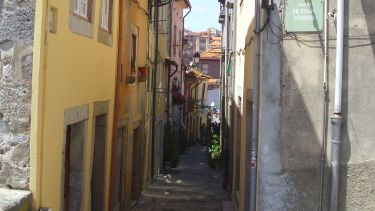Portuguese Studies -2025 entry
Portuguese is the official language of nine countries across four continents and is spoken by over 200 million people. Portugal, Brazil and the rest of the Lusophone world are home to a an incredible range of art, culture and traditions.

Knowledge of the Portuguese language assumes an increasing significance as the 21st century progresses. The richness of literature in Portuguese, as well as the political and cultural history of the entire Lusophone world, make Portuguese Studies an important field of academic study.
Portuguese Studies has been taught at Sheffield since the 1940s and has developed a strong record of teaching and research. Portuguese Studies is a popular choice at Sheffield, which is reflected in the lively, friendly atmosphere within the School. Students study the literature, history and culture not only of Portugal and Brazil, but also of Portuguese-speaking Africa and Portuguese-speaking Asia.
Modules
You will study 40 credits in language and culture at beginner's level.
Beginner's Portuguese
| Title | Credits | Core/Optional |
|---|---|---|
| Portuguese Language Beginners | 20 | Core |
| Languages and Cultures Essential Skills | 0 | Core |
An Introduction to the Social and Political History of Iberia & Latin America This module examines the historical trajectory of Spain, its emergence as a state in the Iberian Peninsula, its imperial expansion overseas into Latin America, the eventual independence of the colonies and their development and consolidation into the various modern-day states we know today. The module will explore the social, political and cultural characteristics of these states and its peoples and highlight the importance of understanding their complex history in the formation of their identities and their cultural and political values. | 20 | Core |
In your second year, whilst continuing to develop your spoken and listening language skills, you will also deepen your understanding of political, social, and cultural contexts. You will also have the opportunity to engage with more specialised thematic modules which explore the relationship between language, culture, and identity. Modules could include:
- Arts of Persuasion
- Why Read?
- Translation
- That is not my (Hi)story
- Language and the Self
- Languages of Gender and Sexuality
- Revolutions and Revolutionary Trends
You'll spend your third year abroad, immersed in your chosen language and culture.
Your final year on the BA Modern Languages and Cultures is about deepening the language and cultural expertise you have developed through your previous study and year abroad. You will then apply this learning to contemporary global issues and a range of career-relevant scenarios. Modules could include:
- A Languages and Cultures dissertation or translation
- Social Approaches to Multilingualism
- Tales of Cities
- Comparative Critique of Consumer Culture
- Migration and its Representations
- Global Careers in Languages
- Music and Performance
The content of our courses is reviewed annually to make sure it is up-to-date and relevant. Individual modules are occasionally updated or withdrawn. This is in response to discoveries through our world-leading research, funding changes, professional accreditation requirements, student or employer feedback, outcomes of reviews, and variations in staff or student numbers. In the event of any change we'll consult and inform students in good time and take reasonable steps to minimise disruption.
Information last updated:

International undergraduate scholarships
We are offering scholarships of £2,500 for each year (subject to a 60% average) of your undergraduate degree. The maximum value is £10,000 for four-year programmes.
